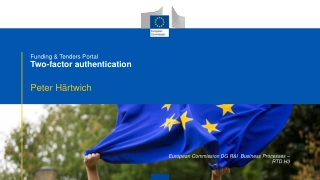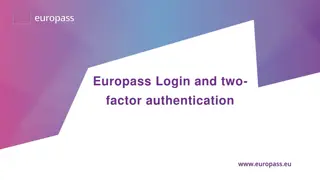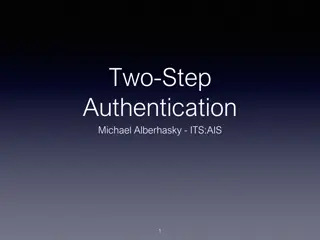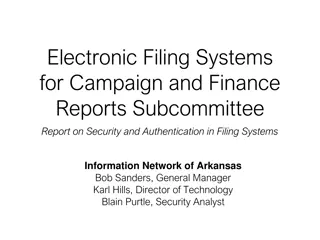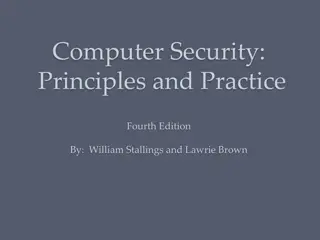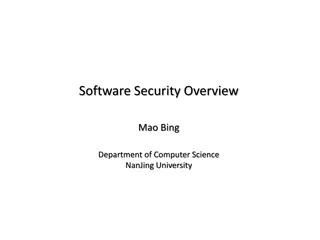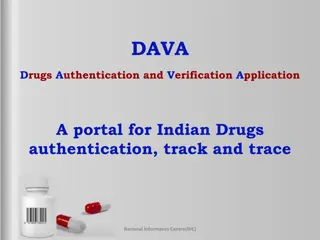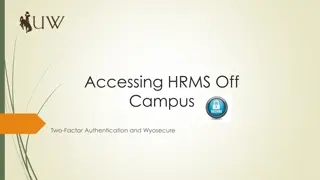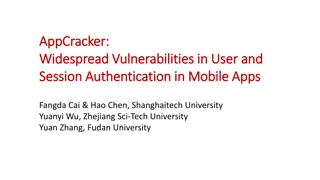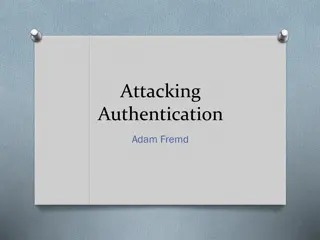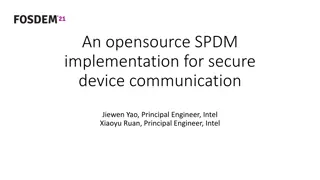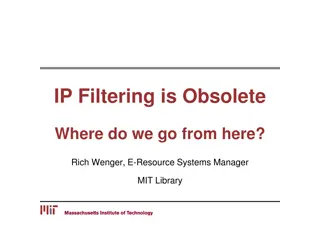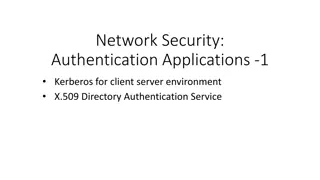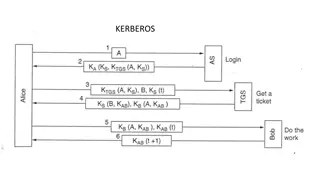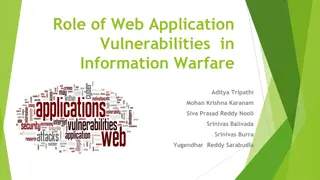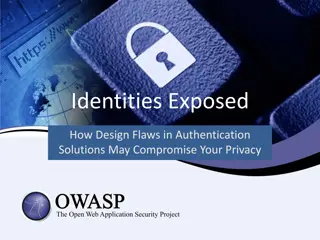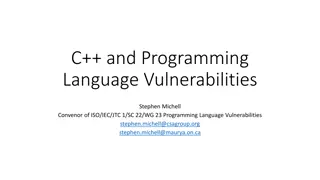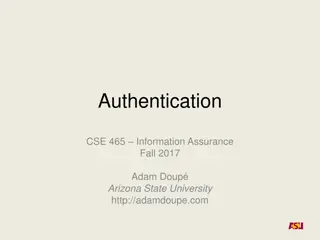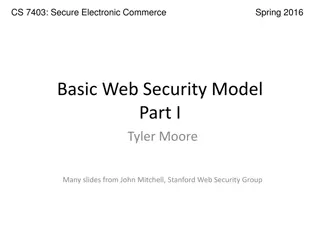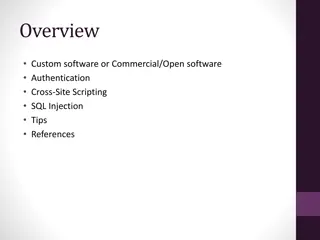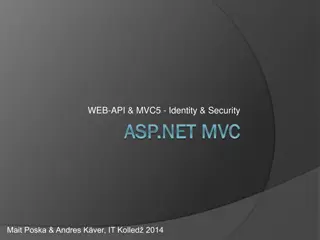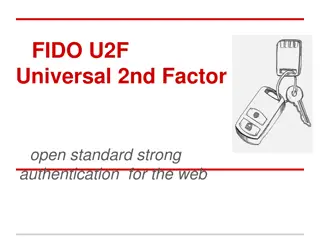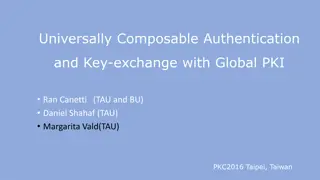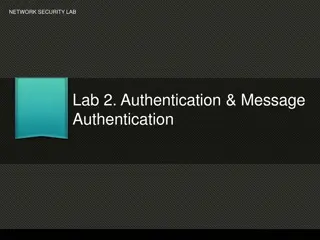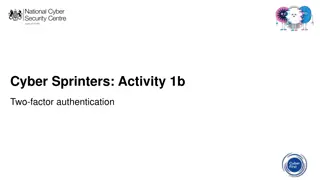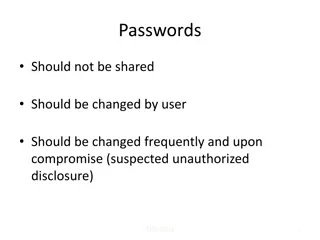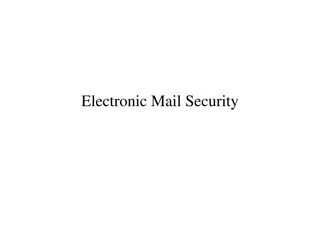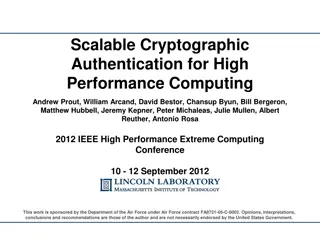Addressing 5G Signaling Protocol Vulnerabilities
The 8th meeting of the Communications Security, Reliability, and Interoperability Council to discuss and address security vulnerabilities in the newly adopted 5G signaling protocol, HTTP/2. Learn about potential risks, recommended safeguards, and the prevention of these vulnerabilities in the upcomi
3 views • 85 slides
Enhancing Security with Two-Factor Authentication in Funding & Tenders Portal
Increase in cybersecurity threats necessitates the use of two-factor authentication in the Funding & Tenders Portal to safeguard valuable information. Users are encouraged to adopt this secure login method, which will soon become mandatory. Methods such as mobile devices, SMS, and security keys are
1 views • 31 slides
Innovations and Vulnerabilities in ISO/IEC 18013 mDL Standard
Explore innovations and vulnerabilities in the ISO/IEC 18013 mDL (mobile Driver's License) standard in this presentation by Francisco Corella. Covering architecture, data elements, authentication methods, security innovations, and privacy goals, the talk delves into the nuances of mDL technology and
3 views • 42 slides
Understanding Vulnerabilities of Individuals with Autism in Disciplinary Hearings and Employment Tribunals
People with autism may face vulnerabilities in disciplinary proceedings and employment tribunals due to impaired theory of mind, communication difficulties, insistence on sameness, stereotyped behaviors, and sensory sensitivities. These challenges can lead to misunderstandings, difficulties in copin
0 views • 10 slides
Guide to Setting Up EU Login and Two-Factor Authentication
Learn how to create your EU Login account and add two-factor authentication for accessing Europass and other EU services. Follow step-by-step instructions to register, verify your email, and set up a secure password. Ensure a seamless process by understanding the difference between Europass and EU L
3 views • 18 slides
Two-Step Authentication Implementation for Enhanced Security
Learn about the implementation of two-step authentication at a university to combat phishing attacks and enhance security. Discover how Duo Security was used to provide a seamless two-step authentication solution, the challenges faced during the enrollment tool setup, and the successful implementati
0 views • 10 slides
Implementing 2FA for UW Azure AD: Best Practices and Options
Explore the implementation of two-factor authentication (2FA) for UW Azure Active Directory (AD) based on key decisions and options outlined in the provided slides. Understand the strategies for enforcing MFA, handling legacy authentication, and transitioning to cloud-based authentication. Discover
0 views • 19 slides
Security and Authentication in Electronic Filing Systems: Arkansas Subcommittee Report
Explore the subcommittee report on security and authentication in electronic filing systems for campaign and finance reports in Arkansas. Learn about user authentication, risks, mitigation strategies, and approaches used in other states. Discover the filing processes in both paper and electronic for
0 views • 24 slides
Understanding Buffer Overflow Vulnerabilities in Programming
Buffer overflow vulnerabilities pose serious security threats by allowing attackers to execute arbitrary code on victim machines. This issue arises from overwriting memory in a way that manipulates the program's behavior. Learn about the dangers of buffer overflow bugs, how they can be exploited, an
2 views • 33 slides
Software Security Principles and Practices: Enhancing Program Code Security
Understanding and addressing critical web application security flaws like unvalidated input, cross-site scripting, buffer overflow, injection flaws, and improper error handling is crucial in enhancing the security of program code. The NIST report NISTIR 8151 provides valuable recommendations to redu
2 views • 44 slides
Understanding Computer Security and Software Vulnerabilities
Computer security, also known as cybersecurity or IT security, encompasses the protection of information systems from theft and damage. This overview delves into software security, control-flow attacks, memory vulnerabilities, and the historical impact of events like the Morris Worm. Various aspects
0 views • 53 slides
Overview of Global Farmed Salmon and Organic Production
The data showcases the production figures for global farmed salmon across various countries, with Norway leading the production, followed by Chile, Scotland, and others. Additionally, insights into the growing organic salmon production, vulnerabilities in the sector, and details on organic mussels p
0 views • 9 slides
Analysis of file:// Vulnerabilities in Android Browser Apps
The study delves into file:// vulnerabilities in Android browser apps, uncovering risks posed by the file:// URI scheme. It highlights how file:// requests can breach app data isolation, potentially compromising sensitive files. The research presents a unified attack model, FileCross automated testi
0 views • 22 slides
DAVA Drugs Authentication & Verification Application by National Informatics Centre
The DAVA Drugs Authentication & Verification Application, developed by the National Informatics Centre of the Government of India, enables authentication, tracking, and tracing of Indian drugs at different packaging levels. Manufacturers maintain Unique Serial Numbers for primary and secondary packa
2 views • 42 slides
Setting Up Two-Factor Authentication for HRMS Access
Learn how to enhance HR system security by setting up two-factor authentication for off-campus access. This tutorial covers the importance of two-factor authentication, using your phone as a second layer of security, initial setup procedures through Wyoweb, requesting permission for HR self-service
0 views • 9 slides
Mobile App Security: Vulnerabilities in User and Session Authentication
Mobile apps face widespread vulnerabilities in user and session authentication, posing threats like eavesdropping and man-in-the-middle attacks. End-to-end security is crucial to protect apps from untrusted networks. App developers must prioritize security measures to prevent unauthorized access to
0 views • 30 slides
Setting Up Multi-Factor Authentication at Moraine Park
Explore the options for setting up Multi-Factor Authentication (MFA) at Moraine Park, with Microsoft Authenticator as the recommended method. You can choose between using the Microsoft Authenticator app on a smartphone, receiving a text message, or a phone call for authentication. Detailed steps for
1 views • 16 slides
Understanding Authentication Mechanisms and Security Vulnerabilities
Authentication lies at the core of application security, serving as the primary defense against malicious attacks. This article explores various authentication technologies, including HTML forms-based authentication, multi-factor mechanisms, client SSL certificates, and more. It delves into common d
0 views • 70 slides
An Open-Source SPDM Implementation for Secure Device Communication
This article introduces an open-source SPDM (Secure Protocol and Data Model) implementation for secure device communication, developed by Jiewen Yao and Xiaoyu Ruan, Principal Engineers at Intel. SPDM aims to enhance device security through protocols for device authentication, session key establishm
0 views • 29 slides
Authentication and Authorization in Astronomy: A Deep Dive into ASTERICS
Explore the world of authentication and authorization in the field of astronomy through the lens of the ASTERICS project. Learn about the importance of verifying identities and granting access rights, the Virtual Observatory Approach, Single Sign-On standards, and Credential Delegation protocols. Di
0 views • 9 slides
Evolution of User Authentication Practices: Moving Beyond IP Filtering
The article explores the obsolescence of IP filtering in user authentication, highlighting the challenges posed by evolving technology and the limitations of IP-based authentication methods. It discusses the shift towards improving user experience and addressing security concerns by focusing on user
0 views • 22 slides
Understanding Kerberos Authentication in Network Security
Kerberos is a trusted authentication service for establishing secure communication between clients and servers in a distributed environment. Developed at MIT, it addresses threats like user impersonation and eavesdropping by providing centralized authentication. Kerberos relies on symmetric encrypti
0 views • 13 slides
Understanding Kerberos Authentication Protocol
Kerberos is a secure authentication protocol developed at M.I.T. to allow workstation users to access network resources securely. It involves three servers: Authentication Server (AS), Ticket-Granting Server (TGS), and the server performing the requested tasks. The AS verifies users, TGS issues tick
0 views • 12 slides
Understanding Web Application Vulnerabilities in Information Warfare
Web application vulnerabilities such as Cross-Site Scripting, SQL Injection, and Broken Authentication pose significant risks in information warfare. Current solutions include Black-Box Security Testing and XSS Analyzers, but they have limitations like static verification and dependence on security
0 views • 21 slides
Understanding Strong Customer Authentication (SCA) for Online Payments in Ireland
The Irish Retail Payments Forum at the Central Bank of Ireland discusses the implementation of Strong Customer Authentication (SCA) under PSD2 regulations. SCA aims to enhance security by validating user identity through two-factor authentication. The deadline for full SCA migration is set for Decem
0 views • 13 slides
Secure Authentication Using ISO 15693 RFID Tags
The authentication process with ISO 15693 tags involves generating a signature using a hash of the tag UID and a private key. This signature, programmed during manufacturing, must match with the one generated by the reader for successful authentication. Advantages include enhanced security with priv
0 views • 7 slides
Uncovering Flaws in Authentication Solutions: A Privacy Concern
Delve into the potential privacy risks posed by design flaws in authentication solutions, as discussed by security consultant David Johansson. Explore scenarios where digital identities can be compromised, the implications of exposed electronic IDs, and the urgent need for software updates to safegu
0 views • 34 slides
Understanding Programming Language Vulnerabilities and ISO/IEC/SC22/WG23
Explore the history and evolution of ISO/IEC/SC22/WG23 focusing on programming language vulnerabilities, led by Stephen Michell. Learn about the formation in 2006, publications, identified vulnerabilities, and the upcoming Edition 3 outlook with language-specific annexes. Discover comparisons with A
0 views • 15 slides
Understanding Authentication and Authorization in Information Assurance
Explore the concepts of authentication and authorization in information assurance through a series of visuals and explanations provided by Adam Doup from Arizona State University. Learn about authentication terms, mechanisms, password systems, and UNIX standard hash functions. Gain insights into how
1 views • 26 slides
Basic Web Security Model for Secure Electronic Commerce
This presentation covers the basic web security model for secure electronic commerce, focusing on vulnerabilities such as XSS and SQL injection. It discusses the decline in web vulnerabilities since 2009 and explores reported web vulnerabilities. The course theme includes topics like web application
0 views • 38 slides
Best Practices for Authentication and Security in Software Development
Explore the importance of secure authentication methods and considerations for custom, commercial, and open-source software. Learn about potential vulnerabilities like Cross-Site Scripting and SQL Injection, along with essential tips and recommendations for safeguarding your systems.
0 views • 24 slides
ASP.NET Web API Security and Authentication Overview
Explore the essential elements of ASP.NET Web API security, including HTTPS transport security, authentication filters, access to client identities, and OWIN middleware. Learn about securing your Web API with integrity protection, replay protection, and encryption for confidentiality. Dive into the
0 views • 29 slides
Enhancing Web Security with U2F Authentication
Explore the innovative FIDO U2F technology, a robust authentication solution for the web that addresses common password vulnerabilities. Learn how U2F works, its benefits for users, service providers, and device vendors, and its user-friendly implementation across various devices. Discover why U2F o
0 views • 18 slides
Modular Security Analysis for Key Exchange and Authentication Protocols
Explore the modular security analysis approach used to examine the security of key exchange and authentication protocols, focusing on the universally composable authentication with a global Public Key Infrastructure. The analysis involves splitting the system into smaller components, separately anal
0 views • 15 slides
Understanding Authentication and Message Authentication in Network Security
Authentication is crucial in establishing identity in the digital world to access rights, products, and services. It involves validating credentials to prove identity and ensure security. Message authentication confirms the integrity and origin of transmitted data, preventing alteration or unauthori
0 views • 24 slides
Understanding Two-Factor Authentication for Enhanced Security
Two-factor authentication adds an extra layer of security by requiring two verification steps to access an account. This process helps prevent unauthorized access even if passwords are compromised. Explore different types of two-factor authentication methods such as text message, fingerprint scanner
0 views • 8 slides
Understanding Authentication in Networking Environments
Authentication is a crucial process in computer networks where clients prove their identity to servers. This article covers the concept of authentication, its importance, and specific guidance on network authentication, particularly focusing on Windows and Linux VMs. Key topics include the use of pa
0 views • 30 slides
Best Practices for Password Security and User Authentication
Password security is crucial for protecting sensitive information. Passwords should not be shared and should be changed regularly to prevent unauthorized access. Implementing strong passwords, two-factor authentication, and biometric security measures can greatly enhance security. Additionally, main
0 views • 16 slides
Understanding Electronic Mail Security: PGP and S/MIME
Explore the world of Electronic Mail Security through the lenses of two prominent systems - PGP and S/MIME. Learn about the origins of PGP encryption, the authentication and confidentiality problems it addresses, and the utilization of S/MIME in business and personal electronic mail. Discover the ke
0 views • 10 slides
Scalable Cryptographic Authentication for High Performance Computing
This work discusses the scalable cryptographic authentication approach developed by Andrew Prout and team for high-performance computing. The LLGrid system architecture, challenges with interactive supercomputing, and utilization of LLGrid for various computing tasks are explored, highlighting the i
0 views • 34 slides

